We believe it’s our responsibility to use our scale and expertise to make positive changes in the areas where we operate in. Therefore, we work with local groups and associations to implement targeted programmes, focused on promoting health, quality education, sustainable livelihoods, and the environment.
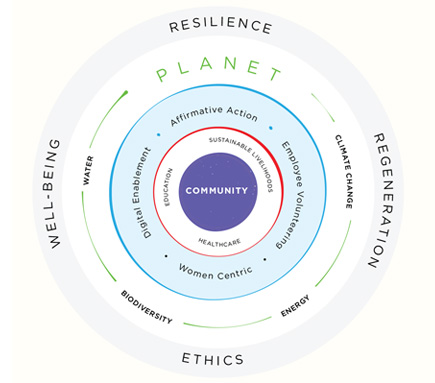
We have adopted the Tata Affirmative Action Programme (TAAP), a Tata group-level initiative that aims to address structural and social inequities in India by providing equal opportunities and inclusive growth to historically marginalised social groups, namely Dalits and tribals, women, and persons with disabilities in India. This is aligned with the framework on Affirmative Action (AA), prepared by the Confederation of Indian Industry (CII), which focuses on four areas of development, namely, Employment, Employability, Entrepreneurship, and Education.
During the year, we revised the CSR Policy and strategy on the basis of the maturity of our own CSR journey, Tata Communications Reimagined strategy, shifts in the global development discourse and amendments to the Companies (Corporate Social Responsibility Policy) Rules, 2014. The Tata Group CSR framework, Tata Communications corporate imperatives, national guidelines, global standards, evolving practices from peers, and research form the five guiding pillars of our approach towards CSR projects. The programmes are aligned with the United Nations’ Sustainable Development Goals (SDGs) in policy and practice.
At Tata Communications, we have prioritised seven SDGs (SDGs 1, 3, 4, 5, 8, 13, and 17) that will work with the United Nations SDGs to promote CSR initiatives through social impact programmes. Our programme is designed to improve the skills and quality of life of underserved, especially women, young girls, and adolescents.
Our CSR programmes are directed by the CSR Committee, which oversees our Company’s social responsibilities and engages in periodic reviews on policy objectives, while also offering guidance on enhancing the scale, quality, and impact of the programmes. In addition, our Global Management Committee (GMC) takes complete ownership of all CSR interventions and offers guidance on how to improve impact on the ground. Furthermore, we also evaluate our projects through independent agencies to ensure that they are relevant and responsive to the needs of the communities, while documenting the best practices.
Tata Affirmative
Action (AA) Programme
In FY 2021-22, 61.4% of the total CSR budget of US $1.46 million (INR 11.30 crore) was spent on AA projects. Of the 19 projects in India being supported under CSR, four projects are 100% AA, two have significant AA focus (70-90% or more), and 13 have partial AA focus (less than 70%).
61.4%
of total CSR budget for FY 2021-22 was spent on AA projects
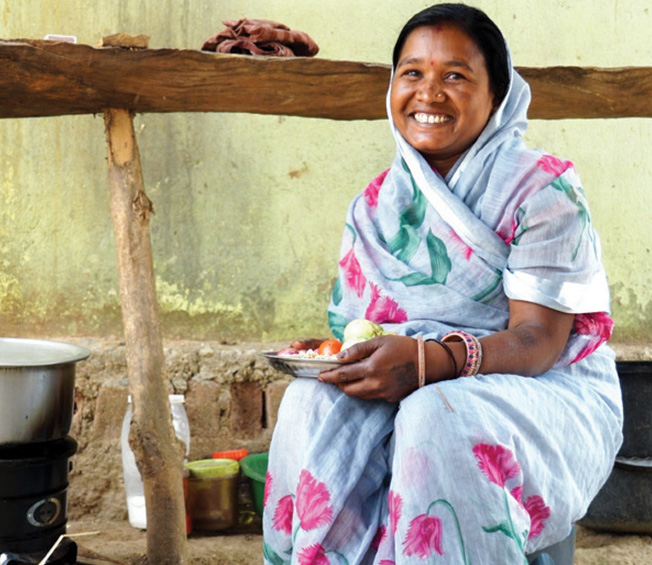
FY 2021-22 highlights
Volunteering hours
COVID-19 relief beneficiaries
CSR spend (INR 11.30 crore)
People benefited
Priority areas
Keeping the community at the centre of development, while recognising its interconnectedness with the natural environment, Tata Communications identifies education, sustainable livelihoods, healthcare and environment as priority areas for its CSR work.
Education

We strive to transform the education system through digital empowerment, educator empowerment, and youth involvement to create exponential social, economic and environmental impacts.
CSR investment
USD $16,612 (INR 0.13 crore)
Lives touched
192,416
Environment

Integrating action on climate change, biodiversity, water, and energy, into community initiatives, and creating partnerships that promote environment restoration and regeneration.
CSR investment
USD $469,738 (INR 3.63 crore)
Lives touched
13,634
Sustainable Livelihoods

Empowering youth and rural communities (especially women) economically and socially through vocational, entrepreneurship and life skills training which enhance access to resources, new technology and financial services, there by supporting them in becoming active contributors to the economy.
CSR investment
USD $769,192 (INR 5.94 crore)
Lives touched
233,305
Healthcare

Ensuring access to quality healthcare services amongst underserved communities (especially women), and equipping local communities with the necessary infrastructure, knowledge, and skills to promote wellbeing for all.
CSR investment
USD $73,965 (INR 0.57 crore)
Lives touched
148,785
We launched the Global Employee Volunteering Programme (GEVP) as a key pillar of our culture. The GEVP motto, ‘for a better world and workplace,’ requires the 12,500 strong workforce from 40 nationalities to go ‘beyond a business,’ and contribute to the social advancement of communities.
In FY 2021-22, 4,039 employees volunteered, clocked 20,472 volunteering hours, and impacted 92,269 lives across several locations in India, APAC, MENA, Americas, and Europe. 76 Employees volunteered in the Tata Group level long-term volunteering initiative ProEngage during the year.
We have also started new interventions within GEVP:
Inspiration series:
A quarterly episode of reflective conversations around interesting ways in which people around the globe are redefining volunteering.
Tata Communications Mentorship Programme (TCMP):
Engaged 30 volunteers in long-term volunteering opportunities within CSR projects.
We have been awarded the highest participation rate (large company category) for our volunteering contributions as part of the just-concluded Tata Volunteering Week (TVW) 15. The award, modelled on the highest volunteering hours per capita, and conceptualised after virtual volunteering, became the norm in 2020, and we are proud to have bagged it yet again, after having won it five times in the past.
A multitude of forces came together in enabling this accomplishment for us. Coinciding with the Tata Volunteering Week15, DRIVE Week 2021 was the virtual avatar of our annual, Company-wide celebration of volunteering, which allowed all employees and their families to come forward and experience ‘giving’, going beyond business, and becoming agents of social change.
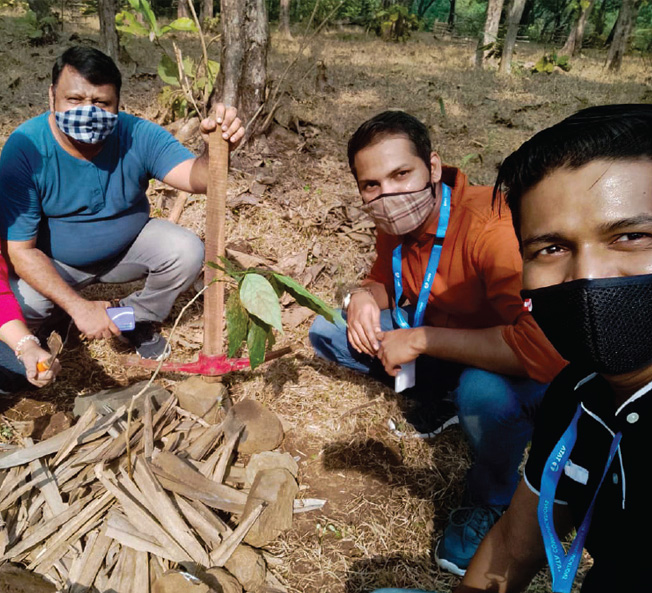
Six of our GMC members as well as our MD & CEO - A.S. Lakshminarayanan, took part in and successfully completed volunteering activities. The initiative saw the participation of 49 members of our leadership team. More than 90 colleagues stepped up as ‘volunteer leaders’ to help manage more than 50 volunteering activities, spread across 10 different causes. Further, expanding our volunteering footprint, employees from more than 20 countries came together to contribute their time, skills, and efforts. We partnered with 20+ organisations to deliver on-ground impact from our volunteering activities that were completed virtually. All the activities were aligned to one of the six leadership behaviour traits, identified by our new internal strategy: Tata Communications Reimagined.
Our collective efforts reached a total of 10,000 volunteering hours in numbers, and the commitment behind these hours stands unmeasured. Our dedicated volunteering helped us make a positive difference to more than 50,000 lives. The lives of these beneficiaries were enhanced with greater access to information, education, and systems of support and opportunities.
Our dedicated volunteering helped us make a positive difference to more than 50,000 lives.
1. Education
We endeavour to promote access to quality education through offering scholarships and helping teachers to build capacity, while encouraging lifelong learning. We work with our non-profit partners to help create sustainable and inclusive technologybased solutions in Haryana, Maharashtra, Karnataka, Himachal Pradesh, Kerala, Rajasthan, Uttarakhand, and Tamil Nadu, across 136 schools and 7 colleges.
 Key initiatives
Key initiatives
• A New Education Worldview (ANEW)
This is an initiative to transform primary education in 110 Gurgaon public schools, providing teachers with advanced teaching methods and practices, integrating technology into the curriculum, improving student learning outcomes, reducing dropout rates, and strengthening community ownership.
183,622
Individuals reached
• Samarth
This scholarship cum mentorship programme focuses on extending financial assistance and guidance to undergraduate students from socially and economically marginalised sections around Pune.
• Kreeda aur Shiksha
This holistic programme seeks to provide quality education to first-generation learners in Bengaluru by leveraging innovative teaching techniques, and digital content, to hone their practical skills, facilitating improved application.
• Global citizenship using ICT
Through this programme, we aim to combine the power of technology-enabled education and critical appreciation to instil the habit of independent, critical thinking in primary and secondary grade learners in Bengaluru.
• School Enrichment Programme
This programme focuses on improving the academic performance of children from low-income schools in Mumbai through innovative learning methods, and by creating a network of community educators as skilled para-teachers, who can contribute toward conducive classroom teaching for children.
• Foundation for Academic Excellence and Access Scholarship (FAEA)
This scholarship is a Tata Group initiative that seeks to extend equal opportunity to meritorious undergraduate students, by supporting their tuition and living expenses.
• Schools in Action for the Planet
This initiative provides education to young students and teachers with a focus on sustainability through specially curated modules on ecological, social, and cultural aspects of sustainable development, and field-based learning in 10 schools in Chennai.
We launched a community partnership with Pitchandikulam forest, Auroville Foundation to equip young learners with the right knowledge, skills, and attributes to live sustainably, and include them in a conversation about the future. But subsequently, lockdowns hit the world and forced us to rethink how we approach environmental education.
We reached out to students via a variety of virtual platforms, connecting with them on modules, such as water, air, trees, and biodiversity, among others. When working with government schools like the Pernthalaivar Kamarajar Girls Government School, the team encountered another stumbling block: many students did not have access to digital meeting platforms. Our project team devised a new method of reaching out to learners via WhatsApp, a more relatable and easily shareable medium. They redesigned the class schedule, created special videos, and distributed Google form links and book pdfs so that students could share and access resources at their own pace.
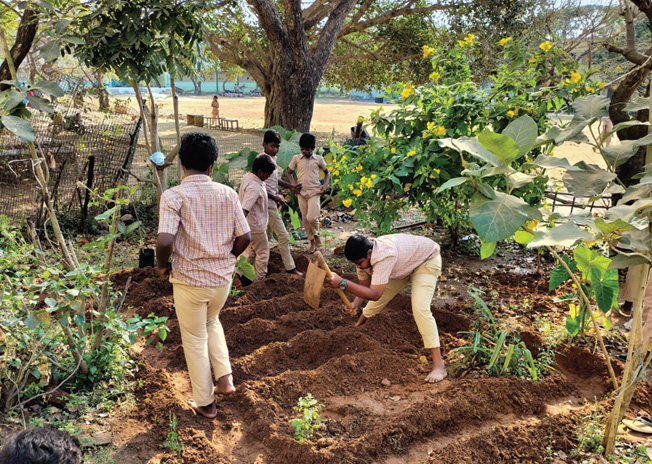
Learners participated in a variety of lessons centred on natural elements, and were given ample time to complete activities that required them to think more consciously about their immediate surroundings. Our project team used the engagement to practise facilitating environmental conversations in low-resource settings.
2. Sustainable livelihoods
We drive sustainable livelihood generation with a belief that a society of empowered individuals, who enjoy a decent standard of living, can create overall prosperity, and help develop a nation.
 Key initiatives
Key initiatives
• Lakhpati Kisan – Smart Villages
Lakhpati Kisan – Smart Villages is a holistic rural development intervention that enables 6,000 households in 41 villages in Dhadgaon block of Nandurbar (the only tribal-majority (>60%) district in Maharashtra, India) to craft their way irreversibly out of poverty, and enhances their quality of life and life choices. This multi-sectoral initiative focuses on irrigation development, agricultural cluster development (high-value and precision farming), livestock development (improved management practices and stock), building an integrated approach to technology in education, drinking water (strengthening sources and enhancing access to potable drinking water), running a communitybased nutrition programme, and setting up institutions to spearhead rural development.
• MPowered
MPowered is an initiative towards empowering some of the poorest and most vulnerable women (the ultra-poor) in Sundergarh, Bolangir (Odisha) and West Singhbhum, Pakur (Jharkhand), who live on less than US $1.25 per day. These women are empowered through mobile technology and interventions that support sustainable livelihood development, and digital, social and financial inclusion. The project supports the efforts of state chapters of the National Rural Livelihoods Mission (NRLM) through livelihood training, seed grant support, facilitation, and capacity building along with the provision of mobile technology, and training on the application and usage of smartphones for livelihood generation, and for availing services of Government and other State programmes.
At the UNESCO World Conference on Education for Sustainable Development in 2021, we announced the establishment of the ‘School of Hope and Empowerment (S.H.E.).’ Tata Communications will create enabling environments for women from marginalised communities to establish themselves as entrepreneurs and leaders in their communities by leveraging the power of digital connectivity and partnerships.
S.H.E. consists of a series of short films that highlight the obstacles that women face when attempting to become entrepreneurs, such as gender stereotypes, family commitments, financial and societal constraints, and a lack of self-belief. We hope to throw light on the stories of successful female local entrepreneurs, and provide them with business grants, mentorship, and digital training, among other resources. As a result, women will be encouraged to pursue their ideas, and bring them to fruition by embarking on a path of financial independence.
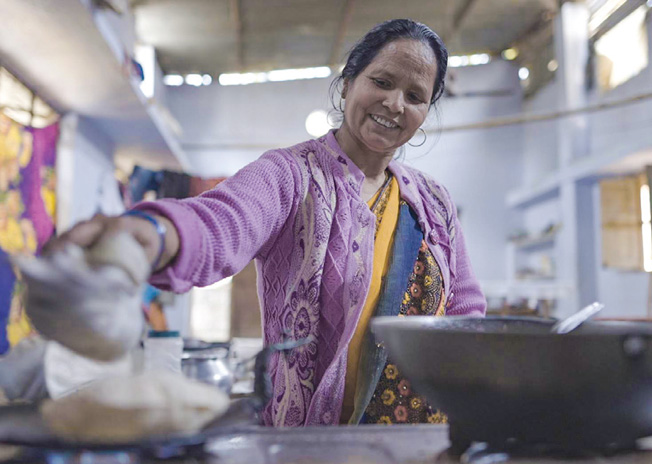
In the first phase, S.H.E. is focussed on aspiring women entrepreneurs in the age bracket of 18-35 years, hailing from low-income backgrounds in the peri-urban areas of Dhanbad, Bokaro, East Singhbhum, Hazaribagh, and Ranchi in Jharkhand. With just 25% of women in the labour force and limited employment opportunities in the region, this project will address the challenges of financial independence of these women. In FY 2021-22, the initiative through the project’s microsite reached out to 1.12 million women, out of which 55,000 completed the educational series and 460 applied for a business grant. Three women have received a business grant of INR 50 lakh each, to initiate their enterprises for enhancing their livelihoods. The next two phases of the project are aimed at including the entrepreneurial women in Odisha and Bihar.
On Women’s Entrepreneurship Day (19 November), we launched a livelihood centre for underserved women, in collaboration with Umang. The livelihood centre, which was introduced in a hybrid format in the presence of civil society organisations, women’s groups, and CSR members, became the first dedicated work and ideation space (beyond training centres) for the women involved in the project.
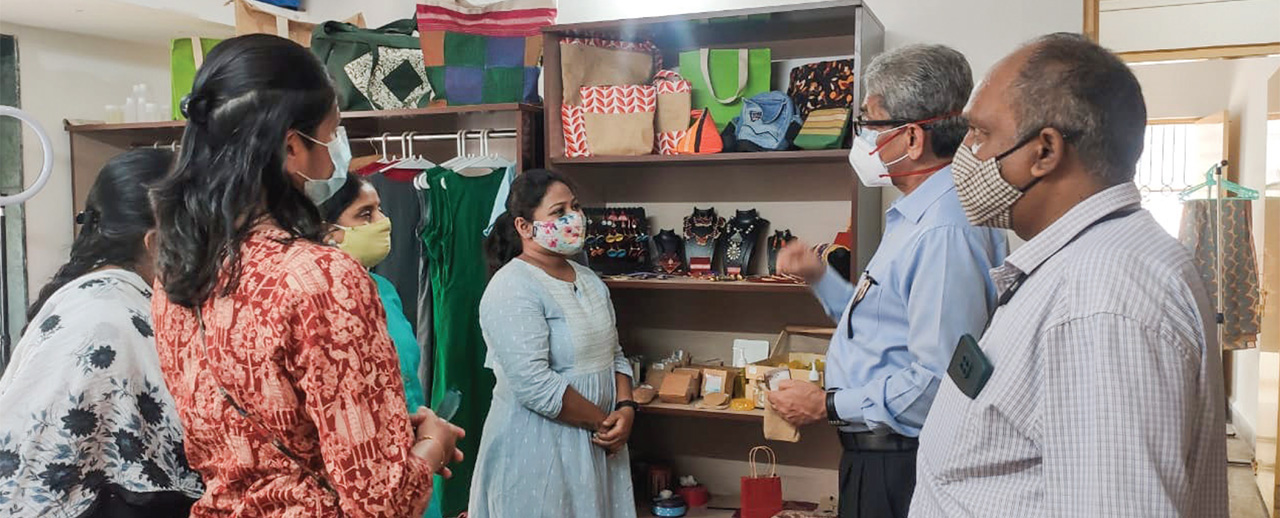
Umang is our joint effort with IDEA Foundation to drive socio-economic empowerment of women, in and around Pune (Maharashtra), with an emphasis on affirmative action. The livelihood centre’s current setup includes stitching and tailoring machines, storage space, cutting tables, and a stitching area.
The centre aims to benefit around 600 women, by enabling them to work from their homes as well as providing access to sophisticated machines. Increasing women’s income and their control over family spending can lead to improvements in child nutrition, health, and education. The space is currently run and managed by 13 Umang alumna from 4 self-help group clusters. As demand and production grows, 50 more skilled alumna of Umang will join the centre as co-operative members.
3. Healthcare
At Tata Communications, we are focussed on improving access to better healthcare services to people belonging to the underserved sections of society, with emphasis on the prevention and care of non-communicable diseases in rural areas.
 Key initiatives
Key initiatives
• Assam Cancer Project
The project aims to reduce deaths caused by Cancer by facilitating early diagnosis and removing the dependency on pathologists. In the project, we have established a ‘telepathology’ infrastructure for cancer diagnosis that offers remote location histopathology analysis. This reduces travel time for patients from remote locations of Assam to bigger cities for primary consultation by enabling pathologists to detect Cancer stages promptly. The scanner at the Centre for Oncopathology (CoP), Wadala Mumbai is also used in the online teaching programme for postgraduate students in pathology.
• National Cancer Grid Programme
The Programme aims to bridge the training gaps observed among the healthcare workers in the Cancer screening programme, improve quality care for patients, training on standard treatment guidelines, improve awareness amongst general practitioners and improve the effectiveness of the Cancer screening Programme across India.
• Drishti
Drishti aims to empower young girls to break free from the gender-health-poverty cycle and reach their full potential by providing employment-linked education in subjects such as English, Math, Science, and Optometry, as well as an e-MBA programme to instil leadership skills. It also aims to improve eye care for and by young girls and women in Bihar by providing school-level preventive eye care, and developing Hospital Information Systems (HIS) for seamless and efficient eye care.
148,783
Lives touched through
healthcare initiatives
Aligned with the mission of Akhand Jyoti Eye Hospital (AJEH) to eradicate bilateral blindness from Bihar, we launched project Drishti. Under this, the focus was on advancing AJEH’s technological capacity and supporting them to nurture young girls as ‘Vision Leaders’– a select cohort trained to conduct vision screening camps, provide specialised eye care, and undertake executive leadership roles within AJEH.
As a part of this mission, our team of optometrists visited Kudar Bandha, a remote village of roughly 2,000 people in Bihar, for eye check-ups of school children.
Our team screened more than 100 children and found 16-17 cases of refractive errors. Most of these cases required glasses but some needed urgent, surgical attention to prevent imminent blindness. We provided all required treatments to these kids free of cost.
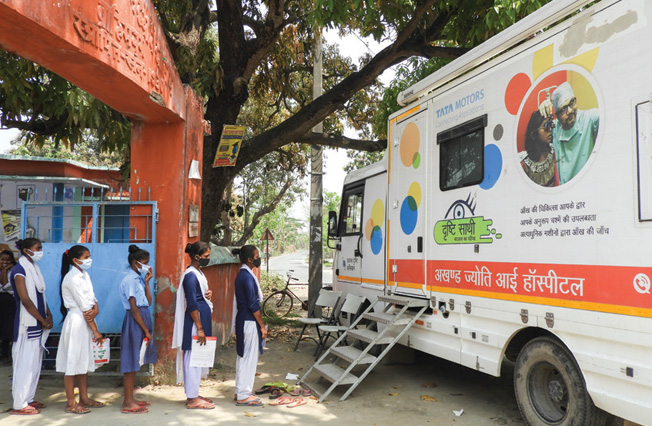
Nikesh Kumar, a 9-year-old learner from Nagra village (Saran district, Bihar) was identified in another camp, after sustaining a serious eye injury, while playing with neighbourhood friends. His parents had no idea about the medical recourse. Nikesh’s parents found hope during our visit to the region for a free eye-care camp. We photographed Nikesh and his information was entered into ‘Navigator’ (a comprehensive data capture and hospital information management tool, developed as part of Drishti), and he was directed to Akhand Jyoti’s base hospital in the same district. Nikesh was seen by a paediatric eye specialist at the hospital, and he underwent a successful cataract surgery on his left eye. Now, Nikesh’s vision has improved.
• Sanjeevani
The project aims at providing the most immediate, mid-term and long-term need-based tangible benefits to the worst affected tribal, rural, and peri-urban communities by COVID-19, across various geographies in India, using the existing network of Tata Communications CSR project partners. In wake of the second surge of the pandemic, Tata Communications chose to stand for the families that had landed on the edge of a financial crisis, due to the dearth of income opportunities and restrictions on mobility. Tata Communications, with the help of implementation partner: Trickle Up India Foundation, has carried out relief work in the form of distribution of dry ration and hygiene kits to 2,600 tribal families, as a result of the loss of livelihood and lack of food, health, and other necessities in three aspirational districts1 of Odisha (Bolangir and Sundargarh) and Jharkhand (Pakur and West Singhbhum).
Additionally, the project has also developed behavioural change communication modules for all the beneficiaries taken up by Tata Communications. The modules are being proposed for dissemination to a wider audience through government healthcare agencies.
2,600
Dry ration and hygiene
kits distributed to tribal
families
1Aspirational districts are those districts in India, that are affected by poor socioeconomic indicators. These are aspirational in the context, that improvement in these districts can lead to the overall improvement in human development in India
Udugama, a small town in southern Sri Lanka, rich in natural beauty and biodiversity, is home to some of the poorest villages. Tata Communications partnered with Watawala Plantations PLC in January 2021 to assist in the creation of an Intensive Care facility in Udugama’s base hospital, bringing the said facilities within easy reach of the community. The new facility will serve a large number of critically ill patients by assisting in the establishment of ICU beds, as well as all necessary equipment, housed in a cutting-edge building.
The new facility is intended to improve hospital capabilities, so that more critically ill patients, including but not limited to COVID-19, can be treated. Currently, we are in the process of constructing a 5-bed ICU with all the necessary infrastructure. The unit is scheduled to begin operations at the end of August 2021. Tata Communications CSR is dedicated to ensuring that no one is left behind as we all grow and prosper.
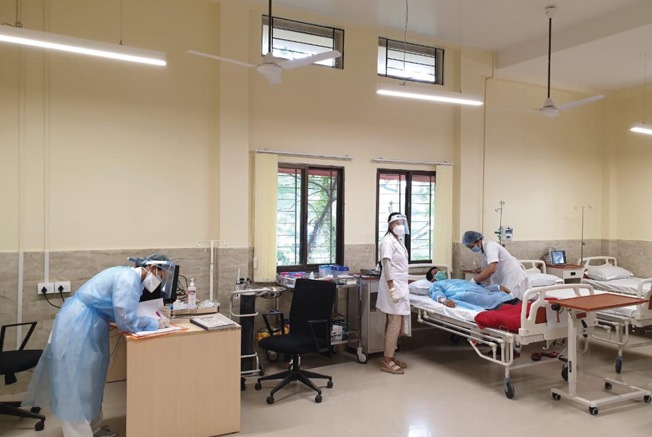
4. Environment
At Tata Communications, we believe in integrating action on climate change, biodiversity, water, and energy into community initiatives, and creating partnerships that promote ecological restoration and regeneration. For this, we would synergise with the programmes and initiatives of Tata Group wherever possible, in a meaningful manner and provide support for disaster rescue, relief, and rehabilitation.
 Key initiatives
Key initiatives
• Climate Resilient Village Programme
This project aims to improve clean energy access through solar power and clean cookstoves, thereby improving the living standards of the rural populace from remote terrain of Meghalaya and Nagaland, and other Northeastern states of India through solar electrification of a total of 350 households, up-gradation of 7 Primary Health Centres (PHCs) and solar electrification, distribution of clean cookstoves to 5,000 households. For FY 2021-22, the project provided clean energy solutions to over 140 households in over five villages and impacted 13,514 beneficiaries in the Garo hills region of Meghalaya.
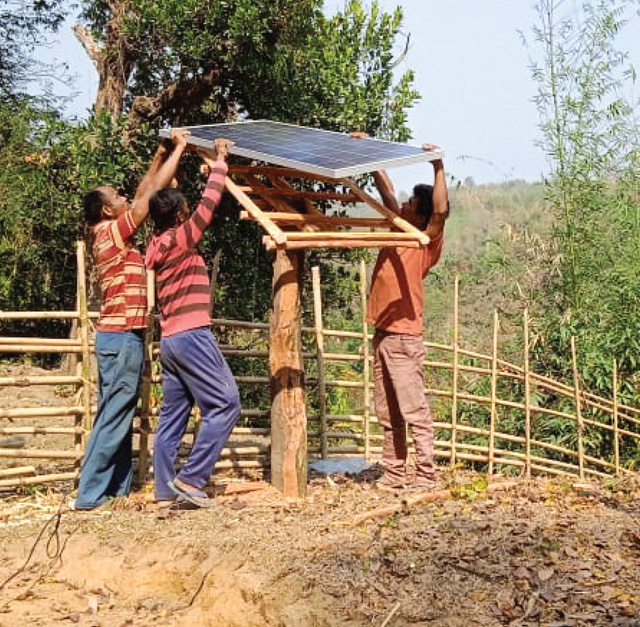
• Nanneer
The project primarily focusses on the rejuvenation and restoration of Nagan Thangal Lake for effective groundwater recharge in Upparapalayam, Pothur village, Villivakkam block, Thiruvallur district of Tamil Nadu. Pothur has about 694 households with a total population of 2,739. The lake has been historically used for irrigation. Spread over 15.01 acres of land, the current water spread area of the lake is 5 acres, and the remaining 10+ acres of lake land is fully silted, covered with thorny bushes. Approximately 75% of the lake area is silted, which has reduced the water holding capacity of the lake. With the rejuvenation of the entire lake area of 15.01 acres, an estimated 24,000 m3 increase in water holding capacity is projected. This, in turn, will ensure continued groundwater recharge and benefit the nearby communities by providing a source of drinking water for domestic animals. Nanneer will ensure restoration of the lake, with ecological restoration methods and plantation of 3,500 plants of Tropical Dry Evergreen Forest (TDEF) indigenous species. The restoration work will include lake deepening, plantation of indigenous trees, shrubs and reeds, and setting up of landforms, such as bird islands to attract and enhance the biodiversity.